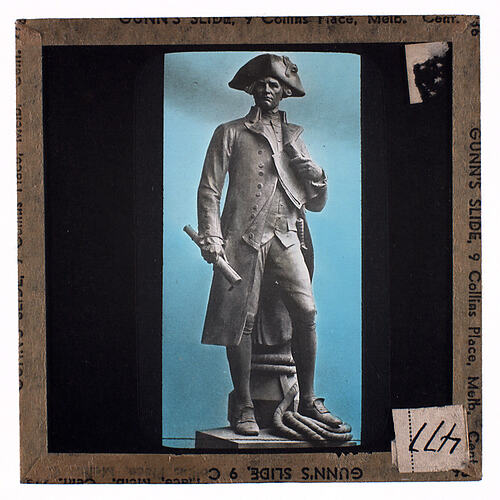James Cook was born on 27 October 1728 at Martonin-Cleveland, Yorkshire, England, the son of a Scottish labourer and his Yorkshire wife. Cook's first experience at sea came at the age of 18 when he signed on as a deckhand aboard a Whitby-based boat carrying coal to London. He was soon apprenticed to Quaker coalshipper John Walker. Cook became an accomplished mathematician in his spare time and was actually offered a command of his own ship but refused and in 1755 joined the Royal Navy as a seaman. Serving on H.M.S. Eagle under the command of Hugh Pallister, within a month he was promoted to master's mate. Three years later he became master on the Pembroke, which took part in the St. Lawrence River operation that led to the capture of Quebec.
Cook married Elizabeth Batts in St Margaret's Church, Barking, on 21 December, 1762. They managed to have six children in spite of Cook's absences.
Following his service on the Pembroke Cook was transferred to H.M.S. Northumberland, which was surveying the coasts of Nova Scotia and Newfoundland. In 1764, at the age of 36, Cook was given his first command in the Grenville. He was a good surveyor and astronimical observer, and his observations of an eclipse of the sun on 5 August 1766 brought him to the notice of the Royal Society. Two years later Cook was commissioned as lieutenant, and the next day joined H.M. Bark Endeavour as Captain.
Instructed to determine the existence of a southern continent, Cook sailed on 26 August 1768. His company of 94 included botanists Joseph Banks and Daniel Solander and the astronomer Charles Green. He sailed south, and on 19 April 1770 Lieutenant Hicks saw land. Ten days later, on 29 April, Cook and his company landed at Botany Bay. Banks, Solander and their assistants hastily collected the unique Australian flora, with a further opportunity during a second landing at Bustard Bay. On 25 May Cook named Keppel Bay the Islands, and 17 days later the Endeavour stuck fast on a coral reef at high tide near Cooktown. Repairs and gales delayed the ship for seven weeks. After naming Cape York and determining that New Guinea and New Holland were separate islands. Cook sailed to Batavia (Java) and then on to England, arriving on 13 July 1771.
The voyage was considered a success, and Cook was promoted commander and given charge of his second voyage the following year. The two ships, Resolution and Adventure, left Plymouth in July 1772, and on 17 January 1773 entered the Antarctic Circle, the first to do so. On his third voyage Cook, now post-captain, went to explore the Pacific coasts of North America and Siberia. In 1779, at Kealakekua Bay in Hawaii, he was involved in a skirmish with the local community during which a chief was killed. Cook shot a man and was himself then killed. It was 20 months before his wife Elizabeth heard the news. Elizabeth outlived James by 56 years, and also outlived all of their six children. She died at 95 in 1835.
Cook's name is commemorated in many place names in Australia, including Queensland by Cooktown, Cook Pastoral District, Cook Highway, Cook Reef and Cook Shoal.
References:
Australian National Botanic Gardens website http://www.anbg.gov.au/biography/cook-james.html
South Pole website http://www.south-pole.com/p0000071.htm
London Borough of Barking and Dagenham website http://www.barking-dagenham.gov.uk/4-heritage/people/p-captain-cook.html
More Information
-
Keywords
-
Localities
-
Authors
-
Article types
